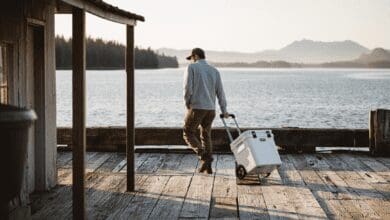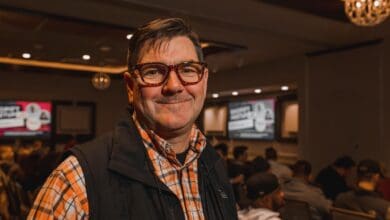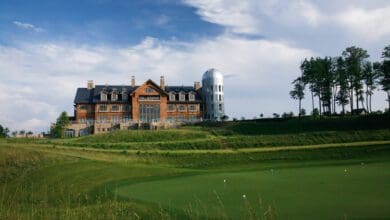Unbroken Arrows The Interview
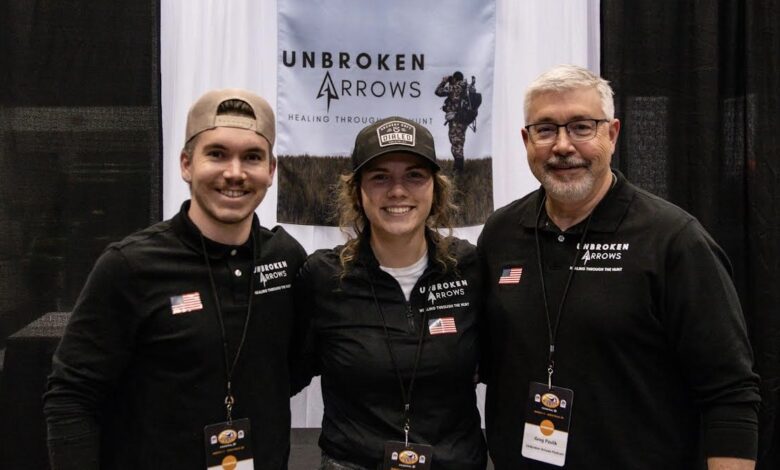
Can you share the inspiration behind starting Unbroken Arrows?
Greg: The idea for a podcast actually started about 7 or 8 years ago. I was the principal at Ogallala High School in Western Nebraska and I was asked to do the color commentary for the local radio broadcasts for some away football and basketball games and I enjoyed doing that, from that my thought was that a podcast to highlight the area and all of the opportunities the area has including the outdoor activities such as hunting, fishing, and camping. Our life activities, working, kids in college, kids getting married, becoming grandparents and moving back to Omaha took all of our time. A few months after our move to Omaha my first wife Holly’s diagnosis with ovarian cancer, her short battle with cancer and her death left me questioning what my life after nearly 35 years of marriage (one week short), raising our five children, and retiring of 30 years of teaching, coaching, and administration was going to be. Fast forward a few years, I met Catherine’s mother, Stephanie, and we were married in June of 2023. One of Stephanie’s and my connections was a love for being active in the outdoors. That love for the outdoors was something that Stephanie and her first husband, Tony, instilled in their five children, one of which is my co-host Catherine. Catherine and I started turkey hunting together and over that time I realized that her knowledge and insight, especially at her young age (she was 17 when we first met) was unique. It was during this time that the podcast idea started to be a thought again as I realized that these hunts with Catherine and the deer hunts with my son Alex prior to meeting Stephanie, were helping me heal from the loss that I experienced with the death of my wife Holly. Catherine and her family also experienced with the loss of a sibling to leukemia, their father to suicide and for someone on the outside looking in at both of our families are broken. In the fall of 2023 I approached Catherine with the idea of producing a podcast about how hunting, fishing, and being active in the outdoors has helped us, and by sharing our story maybe we can help others use the outdoors to work through their life struggles. She was all in and as we discussed possible names of the podcast I mentioned broken arrows and it was Catherine that said, “no, a broken arrow does not fly and we are moving forward, we are unbroken arrows.” I thought that she came up with the perfect metaphor that describes our current path in life.
Catherine: Greg brought the idea to me in 2023 and I was immediately on board. I honestly thought it would be one of those things you say you are going to do but never actually go through with it. When we started making more and more of a plan I started to get excited. It was definitely Greg that started this though so he deserves all the credit.
What has hunting meant to you and your family?
Greg: For me I hunted a lot when I was young but the amount of time I spent hunting dwindled during the period of time of my life that included college, work, marriage and raising a family. As a family we spent a lot more time on the water, fishing, boating, tubing, wakeboarding, than we spent in the field. Over the years I did hunt a few times with my sons and others a few times and only small game, primarily pheasant and squirrel, but I think that my three son’s interest in hunting came from their friends more so than from me and my wife Holly and daughters never really showed an interest in hunting. Personally, I would consider myself a reactivated hunter as defined by the R3 movement. I have hunted more in the past five years than I had in the previous 30 years of my life and I never hunted deer or turkey until my late 50’s and early 60’s so I am learning a lot from Catherine each season.
Catherine: Hunting has always been a massive part of my life. My parents made an effort to take all of us kids from a very young age. I honestly couldn’t tell you the first time I went pheasant hunting because it’s something I have always known. Every year on my birthday, I would get to skip school with my dad to go hunting; sometimes, it was deer, goose, duck, or pheasant. After my dad passed away, my brother Aj and I carried on the tradition. Hunting has always been a way for me to connect with the people I love. I love taking people on their first hunts or hearing their stories. This love and connection to hunting goes beyond any words I could use to explain it.
Your podcast often talks about strong issues in the podcast. How do you feel these issues resonate with the listeners?
Greg: I think that if you take the time to start a conversation with anyone you will find out that they will have a personal story of life struggles. On our podcast we are honest about our struggles in life and I think that resonates with our listeners and hopefully it can help them feel more comfortable to talk to others about their situation. Abruptly losing a loved one by suicide or an aggressive form of cancer is difficult. So is losing a loved one that has to go through years of treatment and care, yes, these are tough topics to share, for us as well. When the dust settles, Catherine and I are just two people that want to share how the outdoors have helped us and we want to provide others the opportunity to share how outdoor activities have helped their healing process. Additionally, we want to share information about the different outdoor opportunities that are available to them, wherever they live, to help improve their physical and mental health.
Catherine: As Greg said, everyone’s been through something. I have found that most people want a reason to talk about those issues and to hear that they aren’t alone. It can be an uncomfortable conversation to start but extremely rewarding. Being able to share my own experiences takes some of the pressure off.
I understand you have launched a new venture and partnered with non-profit foundation. Tell us more about that organization and your goals?
Greg: Catherine’s little sister Rebekah died of leukemia at the age of 10. To honor her Stephanie and Tony started Rebekah’s Legacy Foundation. As Stephanie recently shared the story on our podcast (Season 1 episode #34) Tony was the planner and the “face” of the foundation and Stephanie was the behind the scenes person, with his death, the foundation remained, but its activity slowed and at a board meeting 2023 there was talk of dissolving the foundation. Fast forward to March of 2024. The Unbroken Arrows podcast had a booth at Pheasant’s Forever Pheasant Fest and Quail Class held in Sioux Falls. We really didn’t know what to expect but the response that we received from those that we visited with that were in attendance and from those that we interviewed was humbling. It helped us realize that our podcast was one that others could relate to. After that weekend I happened to see a Rebekah’s Legacy statement on the kitchen counter and I remembered the conversation I had the year before with Stephanie about the likelihood that the foundation would be dissolved. I asked Stephanie if she thought that the foundation could be repurposed and its focus to be expanded to honor not only Rebekah’s legacy, but Tony and Holly’s too. She liked the idea, contacted the board members at the time and the process moved forward. Now known as the Unbroken and Brave Foundation: A Legacy of Hope and Healing, is planning a fundraising event for November. This non-profit organization is rooted in the outdoors and is dedicated to helping children, families, individuals, and veterans who are sick or in need of hope. They provide support to those affected by chronic illnesses and mental health disorders, offering them a chance to heal and thrive. The Unbroken Arrows podcast will be a platform to promote this foundation as we will continue to encourage our listeners to use outdoor activities to improve their physical and mental health.
How can people support the work that you are doing?
Greg: We encourage our listeners to reach out and share their experiences of how outdoor activities have helped them get through a tough time in their lives. People can contact us through our website, https://unbrokenarrowspodcast.com/ or send us an email at unbrokenarrows@gmail.com to share their story of healing through the outdoors. The important part to remember is that we might ask them to share their story as part of our podcast, but just having the opportunity to write about or talk with someone about their story of struggle can be an important step in the healing process. Personally, I have shared this with Catherine and the listeners of the podcast, the conversations that I have with those that we have had on our podcast are healing for me. People need to realize that others are going through events in their lives that are similar and they are not alone when it comes to dealing with the struggles all of us encounter in life.
Also, people that are interested in supporting the work of the Unbroken and Brave Foundation can do so by going to https://www.unbrokenandbravefoundation.org/ to learn more about the foundation and how they can support it by contributing their time, skills, or resources.
How can people listen to your podcast?
Greg: Our podcasts can be accessed on our website, unbrokenarrowspodcast.com as well as through platforms such as iHeart, Spotify, Amazon Music, Pandora, Apple Podcasts, and YouTube.
What are the main themes you cover in your podcast?
Greg: Our tagline is Healing Through the Hunt and that, in part, refers to Catherine’s and my journey together, but in reality our main themes are all things outdoors. First of all we share what we are doing outdoors individually, together, and as a family. A lot of Catherine’s time is spent in preparation for her archery hunts, so we do spend time each month with her updates. This year she and her boyfriend are preparing for a pronghorn hunt in the Black Hills. We share our experiences because they are varied. We are active with hunting and fishing, but we also play pickleball, we walk, hike, birdwatch, kayak, and go on UTV/side by side trails. With some of these activities we have quite a bit of knowledge and experience to share, some of the other activities we highlight we are just learning about too. We want to model to our listeners that we are actively seeking new ways of becoming more active in the outdoors like we encourage our listeners to do. Another theme of ours is to highlight some of the organizations that work with our nation’s veterans and active military members. There is a history of military service in both Catherine’s and my family and I currently have a son serving in the Air Force and a daughter serving in the Navy. The news contains many stories of how our veterans and our active military struggle with both physical and mental health challenges. We hope that by raising the awareness of the outdoor activities provided by some of these non-profit organizations, it can help more of our veterans and active military make connections that can improve their physical and mental health. Last, but certainly not least, we ask our listeners that if they, or someone they know, is thinking of suicide, or in need of crisis intervention, to seek assistance by calling the suicide and crisis lifeline by dialing 988, to reach out and let someone know that they are in crisis, do not suffer in silence.
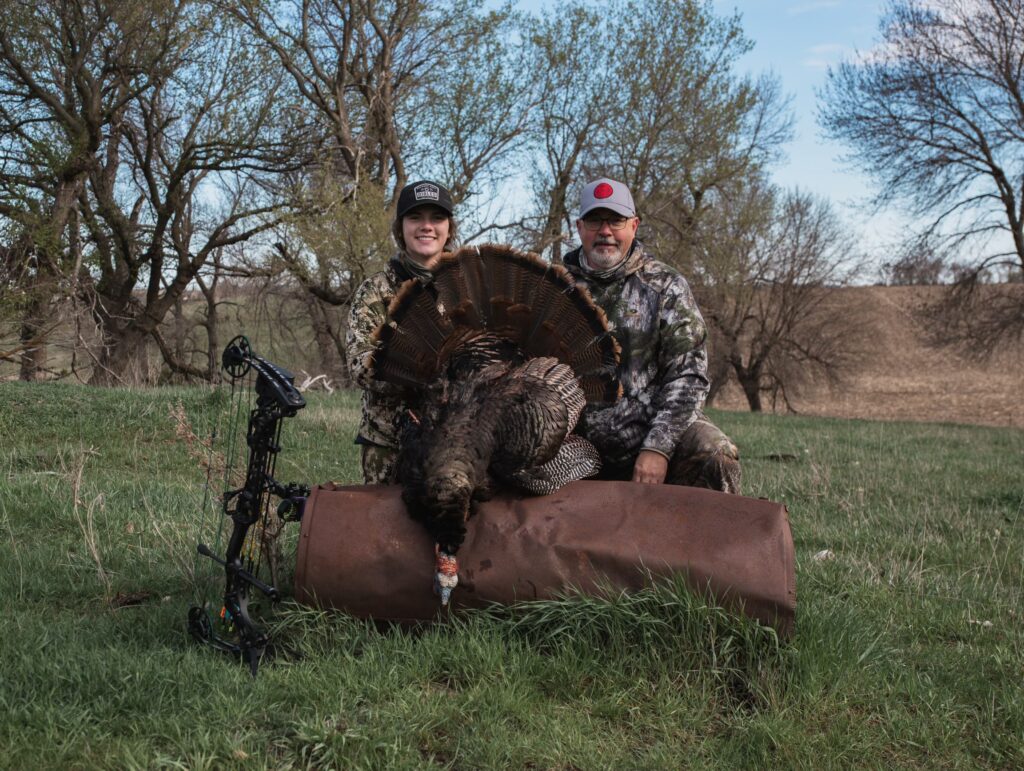
Can you share one of the most impactful stories you’ve covered on your podcast?
Greg: It is hard to narrow it down to one, but I would say that it would have to be our first guest, our first interview, which was with Dave Endicott (Season 1 Episode #3). Dave and his wife Esther purchased an 11 acre tract of land along a river in northern Minnesota so they could have a place to camp, but their focus changed. Instead, their land is now known as Camp Christopher, named for Dave’s brother Christopher who died by suicide. Dave and Esther’s story of how they made their land available for those that have been impacted by suicide and/or mental health isses is inspiring and is the type story that we want to share on our Unbroken Arrows podcast.
Catherine: I don’t know if I could pick one. Many of them have shared so much insight and experience with us. I have really enjoyed doing the interviews with my family, but it has also been eye-opening to hear others’ experiences.
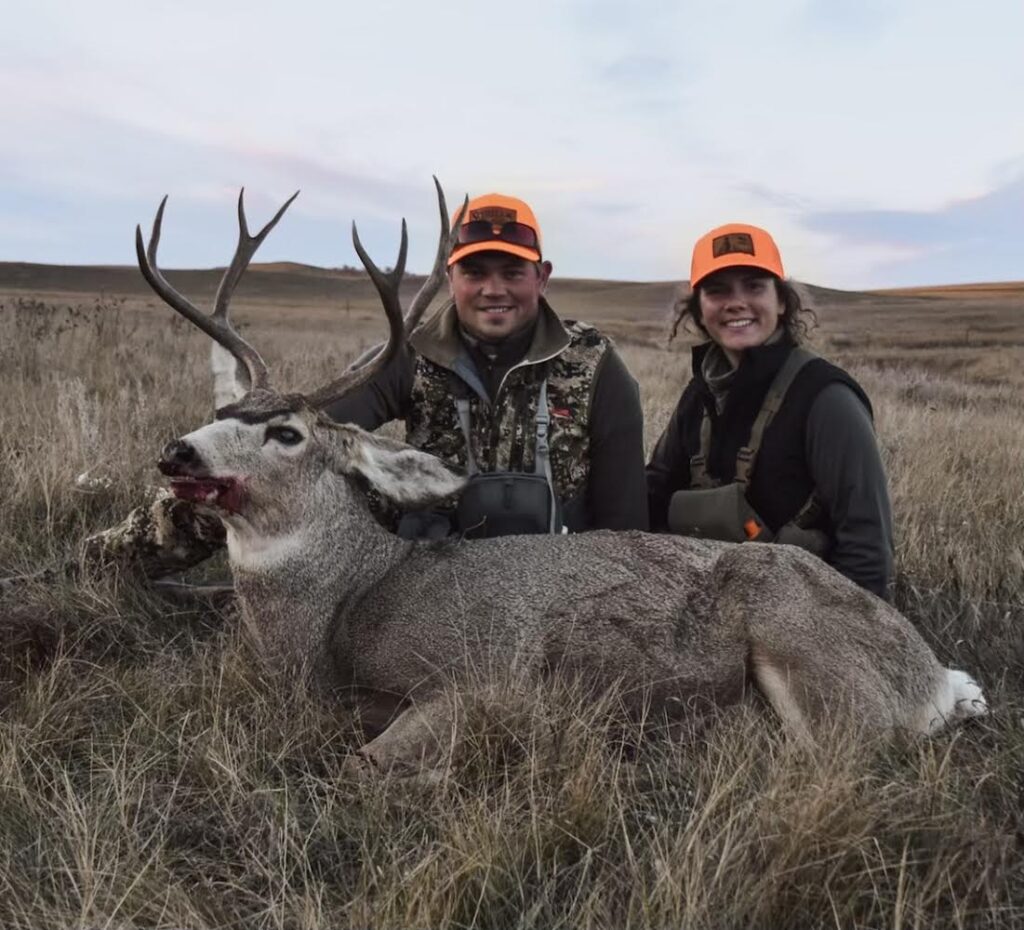
How do you choose the subjects for your podcasts?
Greg: We share our personal outdoor adventures, but we also look for guests to interview that can provide our listeners with a variety of ways to be active in the outdoors. We have interviewed leaders of clubs such as the Big Sioux Fly Fishing club that encourage people with little or no experience fly fishing to attend and learn more about an activity that might become more than just a passing interest. Since we live in South Dakota, and I am originally from Nebraska, we have interviewed representatives from the Game, Fish, & Parks from both states about the opportunities provided by them for our listeners to enjoy the outdoors. Some of our podcast topics are informational, and as a former teacher of science, the ideas usually come from questions brought on by observation. An example would be season 1, episode #23, Everything Elk. My wife Stephanie, Catherine’s mom, and I were riding the trails in the Black Hills this spring and were fortunate to see some Elk on the trails, but we were asking each other questions that we were not able to answer. We were out enjoying the outdoors as the podcast encourages others to do, and if we had questions, maybe others would have these same questions. It was that event that led to that episode. We try to provide a variety of topics that relate to the outdoors in some way.
What has been your most challenging episode so far and why?
Greg: My interview with Sean Adams of Wings of Valor Lodge (Season 1 Episode #12) was one that was challenging for me to get through. I was overcome with a variety of emotions during the interview and I don’t think that I can pinpoint any one reason as to why. My son Trey was with me during the interview and we talked about how that was one of those times a person is ambushed by their emotions. I think that life experiences, both mine and those of others, sometimes come into focus and are manifested in peculiar ways.
Catherine: Our very first episode was probably the most difficult for me. Publicly sharing my experiences was new for me. It can still be really hard to talk about all the pain I have experienced and to listen to Greg talk about his hardships.
Can you share a story of how your podcast has made a difference in someone’s life?
Greg: I can’t say that I have had anyone say that a story of ours has made a difference in their lives, but I know that both Catherine and I have been told by some of those we had on our podcasts as guests and some that have listened to our podcasts that they appreciate that we are sharing our story and that they appreciate that we are open and honest about the events in our lives that have brought us to where we are today. I can only speak for myself but our podcast has made a difference in my life, and it is because Catherine said yes to being my co-host. There are over forty years between us, but I can still learn things from her on the topics we discuss and knowing some of the things she has been through in her young life there are events in my life, past and present, that I am able to work through because I get to hear things from her perspective.
What are some of the behind-the-scenes challenges that you face while producing the podcast?
Greg: I would guess that the average podcast listener does not really appreciate how much time goes into producing a podcast and we are not one of the “polished” podcasts that one can listen to. When you add up the time it takes to coordinate interviews, the time to record the interviews, then you add in the time it takes to edit the recorded interview you begin to realize why of the millions of podcasts that are created each year only 44% have less than 3 episodes. The fact that we have published a weekly episode since December 21st of 2023, puts us in rare company according to the statistics that I have seen. Another challenge for us is that Catherine is a full time college student and works part time, so it is difficult for our schedules to mesh, but we make it work most of the time. It helps that I am retired.
Catherine: I would say time is probably the biggest struggle. As Greg said, I am a college student with two part-time jobs. My days are very full, so scheduling another thing can be difficult. Greg does a lot of the editing and scheduling, which helps, though.
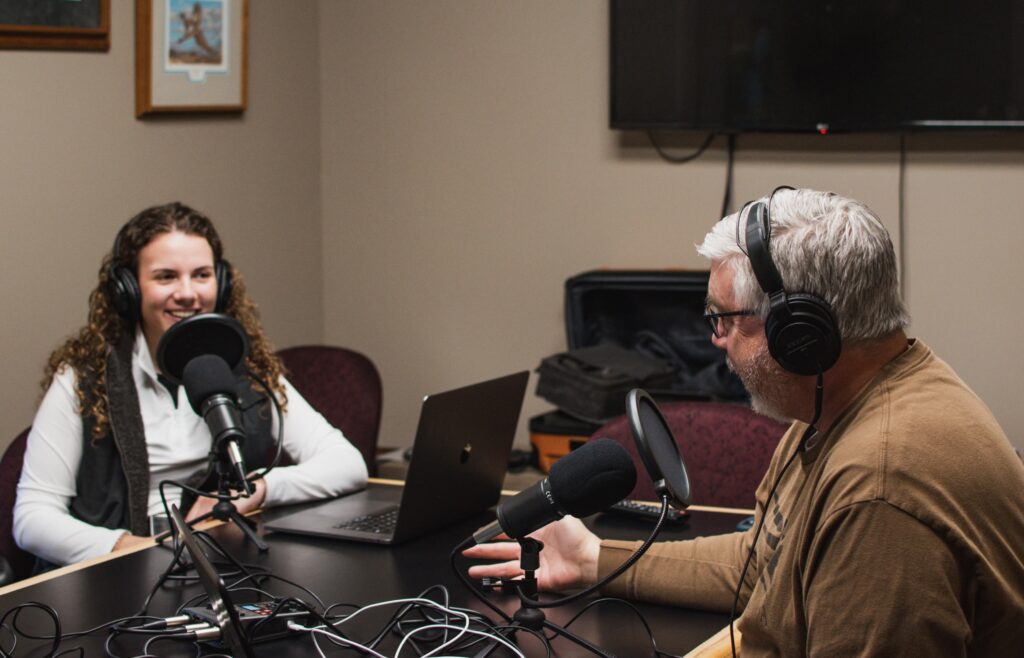
How do you handle the emotional impact of some of the stories you share?
Greg: For me, hearing the stories of others actually helps me put the events in my life into a better perspective. We have been able to visit with people, not just our guests, that have been through so much yet have the determination to continue to move forward, in Catherine’s words, like an unbroken arrow. We are all impacted by events in our life that make us feel a range of emotions, we all ride through those hills and valleys, but oftentimes is when we hit those valleys that we forget about the others that are going through the same or similar low points that we are dealing with. Hearing the stories of others can help us sort through those emotions, especially when we start to think that we are the only ones feeling that low.
What is your favorite part about producing Unbroken Arrows?
Greg: The conversations, both with Catherine and with our guests. I enjoy the prep work for the interviews and the interview itself. I learn a lot from the people we talk to and Catherine makes me laugh. She puts the old guy in his place sometimes with her quick wit and I put her to sleep when I start talking about science related topics with our guests. A few months back I realized that even though “Healing through the Hunt” is part of our podcast’s title, the podcast has become my “Hunt for Healing.” I didn’t know at the time that moving forward with producing this podcast was going to help me as much as I hoped that it would help others.
Catherine: I would agree with Greg. I have been told that I talk a lot, so getting to do it on a podcast has been really fun. I have enjoyed talking to new people and old friends to share their stories and learn more about what keeps them moving.
Where do you see Unbroken Arrows going in the future?
Greg: Great question! I think everything runs its course in time and I tell Catherine that it is my hope that this creative venture of ours helps her with her future endeavors, so I guess my hope is that at some point she takes over the podcast or with her vision she can guide it through a metamorphosis into the next generation of multimedia that will come down the road as it is just a matter of time that it will. But I am sure that if and when that happens I will have stepped back from the podcasting world and will be found somewhere outside, enjoying the outdoors, and will be experiencing its healing powers.
Catherine: Greg always says that one day, I will take over the podcast and go solo. While I am not sure if that is true, I want to see this continue in the future. I believe there are so many stories left to share and more people to impact.



